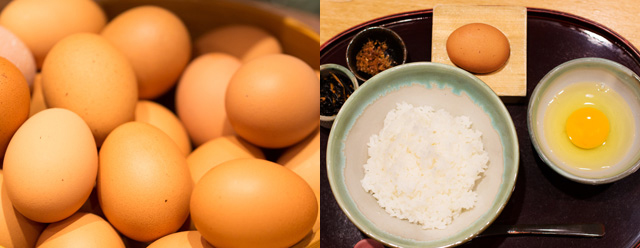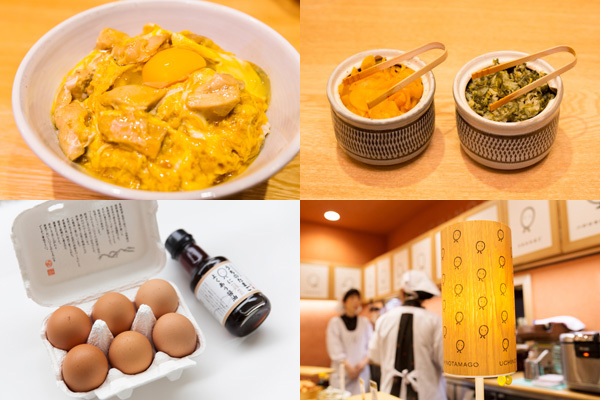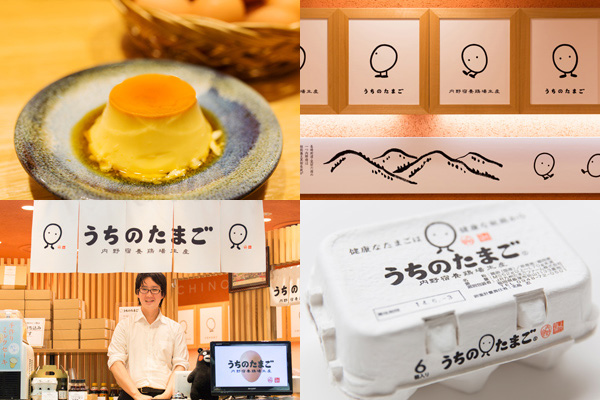Tamago Kake Gohan (TKG): Delicious Raw Egg Over Rice - Popular Japanese Breakfast
Jun 12,2014
Tamago Kake Gohan (TKG): Delicious Raw Egg Over Rice - Popular Japanese Breakfast
Jun 12,2014

Tamago Kake Gohan (Raw Egg Over Rice) at Haneda Airport
Akasaka Umaya Uchinotamago Chokubaijo
Tamago kake gohan is a uniquely Japanese dish that uses a raw egg as the main ingredient, a rarity in the world.
Calling it a dish might be a stretch, since all it is is a raw egg dropped on of a bowl of piping-hot rice. But even something this simplistic is a good source of carbohydrates, fats, protein, and plenty of vitamins. Tamago kake gohan is the simple-is-best adage taken to the extreme.
For this article, we visited Akasaka Umaya Uchinotamago Chokubaijo, which runs a branch in the terminal building of Haneda Airport, the busiest airport in Japan with approximately 69 million passengers a year (190,000 passengers a day on average). From 8 a.m. when its doors open to 9 p.m., the shop’s 15 seats are packed with travelers in search of a delicious bowl of tamago kake gohan.
Since the chain’s sole selling point is the deliciousness of its rice-and-egg combination, it is naturally very particular when it comes to the quality of its rice and eggs.
Ikeda Daiki, manager of the Haneda Airport branch, describes their devotion to quality. “The healthy hens that lay our delicious eggs are raised on a poultry farm in the abundant nature of Iizuka, Fukuoka. The free-range chicken grounds are only enclosed by fences to keep out deer. It’s a very tranquil environment, and the hens thrive free of any stress.”
JR Kyushu Farm, a group company of JR Kyushu, operates the poultry farm, and each day freshly-laid eggs are transported by air to the store. Eggs gathered from productive hens, which are kept for only 15 months from 120 days of age, are covered with a protein layer called cuticle that is impervious to mold and bacteria even when exposed to air. When I held one in my hand, it felt small but weighty. The shell was so sturdy that when I tried to crack it, I couldn’t get it to break.

After several blows, I managed to crack the shell open, only to be surprised at how robust the inside was. The roundish yolk jiggled on the springy white.
It was somewhat tough to mix the yolk and white together with chopsticks, and I couldn’t get a uniform consistency. Apparently, this is a sign of a healthy egg. On tasting it, I found it had a mild texture on the tongue with a delicate sweetness.
I was served this firm egg on new Hinohikari rice from Kumamoto with a sprinkle of Uchinotamago’s special soy sauce made with soup stock that brings the egg’s natural umami to the fore. It was impossible for this combo to be anything but delicious.

The tamago kake gohan course is 550 yen. It consists of one egg and one bowl of rice, with a free refill, along with dried bonito flakes in a small bowl. As a bonus, they have all-you-can-eat tsubo-zuke — daikon radish from Miyazaki pickled in a pot, and tojinna — Chinese cabbage from Nagasaki — as condiments. Ask for the optional miso soup (100 yen) with sea lettuce from Ariake Bay, and you have a complete breakfast right in front of you.
“Many of our customers are women, and everyone takes another bowl of rice and a second egg. I was speechless when a customer once told me that tamago kake gohan was a drink. (laughs)”
Since the chain opened its outlet here, the first in the Tokyo region, in July two years ago, tamago kake gohan has become firmly established as a breakfast for travelers.
“The reason we opened an outlet in Haneda Airport is because it’s the gateway to Tokyo and information from here travels fast. We want more people to know about the charms of Kyushu.”
The store has other egg-based items besides tamago kake gohan. Two popular choices are Tamago Dakedon (550 yen), in which two scrambled eggs are simmered in a special broth over which a raw egg is poured, and Oyako Don (750 yen), an egg rice bowl that features a generous portion of free-range chicken from Saga.

The chain’s delicious eggs pair well with rice and they are used to great effect in sweets too. Both the milkshakes (350 yen) and puddings (250 yen) are sumptuous sweets made with lots of eggs. It is also possible to have eggs for takeout (420 yen for a carton of a half-dozen eggs).
Mukasa Chieko, a breakfast expert we featured in an earlier article, said of eggs: “Eggs are natural super capsules packed with nutrients, such as fat, calcium, iron, and vitamins, to nurture the life of chicks.” After eating these egg-centric dishes, I feel like my skin has gotten smoother and my body is brimming with energy.
